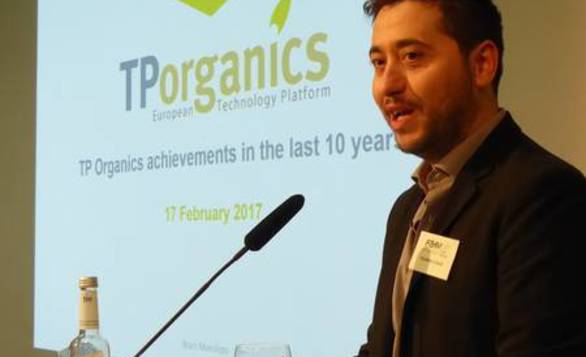On February 17, 2017, the fifth Science Day took place at BIOFACH, the World Organic Trade Fair, in Nuremberg, Germany. It was a joint event of TIPI, the Technology Innovation Platform of IFOAM and TP Organics, the European Technology Platform for Organic Food and Farming.

17-mar-2017
The morning session was devoted to the review of TP Organics' achievements in the wake of its 10th anniversary and the development of a new long-term strategy.
The participants had the chance to put forward their priorities for TP Organics' advocacy work and suggestions for improving services for members. Based on the outcomes of the workshop, TP Organics will prepare a draft strategy document which will be open for consultation during spring-summer 2017. The final strategy will be presented at the Organic Innovation Days on 15-17 November in Brussels.
TIPI organized the afternoon session, which focussed on identifying the research gaps in organic food and farming systems in the context of international cooperation. After the welcome and introduction, Christian Andres (TIPI Scientific Secretary) launched the condensed version of TIPI's vision and strategic action plan. In the following, Urs Niggli (FiBL Director & TIPI President) gave an input presentation on the current state of the most important knowledge gaps in organic food and farming systems, and David Gould (Program Facilitator and North America Representative, IFOAM - Organics International) held a speech on how to effectively advocate for organic food and farming systems research. All the presentations can be downloaded from Organic Eprints![]() .
.
However, the main part of the afternoon was dedicated to a workshop, which aimed at contributing to the development of a strategic research agenda for organic food and farming systems in different regions of the world. The workshop (World Café) posed the following questions:
Participants suggested several simple and cost-efficient tools to follow up on the above-mentioned ideas. As for how the prioritization should be done, the need to make use of the current (global) political agendas was expressed (e.g. make organic research priorities a part of the Sustaonable Development Goals). Finally, there is a strong need to understand the stakeholder landscape in order to select the most accessible potential funding sources. The insights gained in the workshop will help to better position organic food and farming systems research on the agenda of major international players.
Finally, Urs Niggli summarized the constructive discussions and inputs made during the afternoon in his closing remarks, and he gave an outlook on further steps in the near future.
Contact: Christian Andres, Department of International Cooperation FiBL
Fuente: FIBL